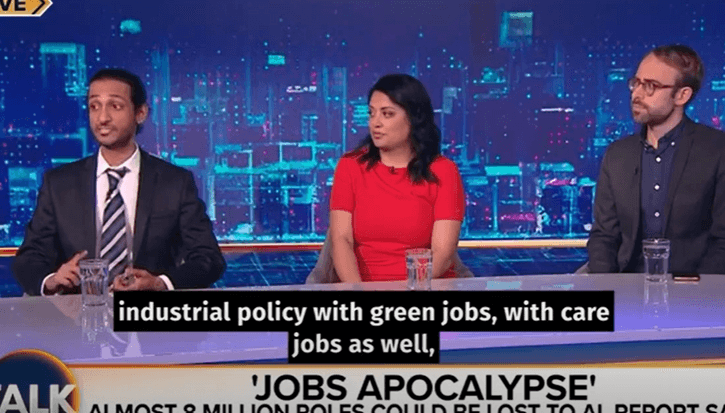The unideological electorate: Why leadership not leftishness is crucial to Labour’s rejuvenation
Article
People who join political parties are relatively rare and unusual individuals. They have a passion for and interest in politics that is not widely shared by their fellow citizens. Many have strong beliefs about what government should do. They may even think of themselves as ‘leftwing’, ‘socialist’ or as a ‘libertarian’, and seek and enjoy the company of fellow believers.
These qualities were seen in abundance in the Labour party during the summer. The party’s leadership election became the stage for a battle for its ideological soul of a kind not witnessed since the 1980s. At one end of the spectrum, Liz Kendall put forward a strongly ‘modernising’ platform that her critics dubbed ‘Tory-lite’. At the other, veteran leftwinger Jeremy Corbyn invited the party to reject ‘austerity’ and endorse nuclear disarmament. Yvette Cooper and Andy Burnham found themselves scrapping with each other for the space in between.
Once polling in July first suggested that Corbyn might win the contest, the central question of the battle came to be whether or not the party could afford a ‘lurch to the left’. Corbyn’s critics argued that however much the party might like to pursue his ideas, they lacked credibility in the eyes of voters. If he were to become leader, they said, the party would be ‘annihilated’ at the ballot box as a result. His supporters, in contrast, pointed to the crowds flocking to Corbyn’s meetings (and indeed signing up to become party members and supporters) as evidence that a change of stance offered the party an opportunity to reinvigorate itself.
But was the party wise to make this the main question to have been asked about the candidates? In the wake of the party’s serious and unexpectedly severe electoral defeat in May, should the supposed ideological stances of the candidates really have been regarded as their defining characteristics? Such things might excite party members – on both the left and the right – but how important are they in determining whether voters decide to back the party or not?
Left or right: the not-so-simple question
Some invaluable insight on this question is to be found in the latest wave of data from the British Election Study (BES). In collaboration with YouGov, this major academic project has conducted regular online interviews with no fewer than 30,000 voters since February 2014. These same voters were interviewed again after the general election, and so now we know which of them voted Labour and which did not. Moreover, because in most cases we also have a record of how they voted in 2010, this means we can also identify who remained loyal to Labour in 2015 and who defected to vote for another party.
The latter are not an especially large group (although there are still over a thousand of them in the BES sample). It is often forgotten in the angst about the party’s defeat in May that Labour did actually win a higher share of the vote in May than it did in 2010. In practice, many attempts at trying to explain why Labour lost have really been an exercise in trying to explain why the party failed to attract more new recruits rather than an analysis of why it lost votes. Inevitably in any such exercise, much turns on what assumptions are made about who those missing new recruits should have been. On the other hand, the nearest we have to hard evidence as to why people actually rejected Labour is to look at what distinguishes those who gave up on the party in 2015 from those who remained loyal.
Meanwhile, unlike most polls, the BES has the time and the space to ask its respondents a myriad of questions, including about where voters think the parties stand on the ideological spectrum. The results immediately raise doubts about whether voters necessarily share the membership’s preoccupation with ideology, and suggest that for many of them terms like ‘left’ and ‘right’ are just not part of the world that they inhabit.
When respondents to the BES survey were asked just before the election campaign to give a mark out of 10 to indicate how leftwing (denoted by 0) or rightwing (denoted by 10) they thought Labour was, more than one in five (22 per cent) simply said they did not know. Labour was not unique in that respect: exactly the same proportion said the same when asked about the Conservatives. And neither is it simply a question of voters being unaware of the parties’ positions: almost as many (19 per cent) were unable to say how far they themselves were to the left or right.
This does not seem to be a question simply of terminology either. Voters don’t necessarily find it easy to say where a party stands even if more everyday language is used to describe what we might mean by ‘left’ and ‘right’. When asked to state where they stood between ‘Government should try to make incomes more equal’ (scored 0) and ‘Government should be less concerned about equal incomes’ (scored 10), the proportion of BES respondents who said they did not know what mark to give themselves was notably lower, at 13 per cent. Yet even though their own personal stance on this question might be understood as one of the ideological characteristics that most sharply distinguishes Labour from the Conservatives, as many as 25 per cent said that they could not say where Labour stood – and again, the same was true when asked about the Conservatives. In short, many voters still struggle to discern the ideological stance of a party, even in the immediate aftermath of an election and even when the language used is a little more accessible.
Ideological judgments, loyalty and defection
Still, perhaps perceptions of the ideological stances of the parties do matter among those voters who are willing and able to use terms such as ‘left’ and ‘right’. And perhaps we can already see in what happened to Labour in 2015 a warning about the consequences of being seen to be ‘well to the left’. Perhaps those who defected from the party between 2010 and 2015 were especially likely to regard Labour as a party of the left (not least, perhaps, as a result of the policies and tone adopted by former leader Ed Miliband) and recoiled in horror. After all, the BES data suggests that around 45 per cent of those who defected from the party did so in order to vote for parties of the right: that is, for the Conservatives or Ukip.
Yet this is not what we find – in fact, the very opposite is the case. Those who defected from the party in May on average actually put Labour slightly further to the right than did those who remained loyal to the party – on the 0–10 scale, defectors gave the party a score of 3.7, while loyalists scored it at 3.4. Moreover, this is even more clearly the case on the question of more or less equality: defectors on average put Labour at 3.9, whereas loyalists gave it a score of 3.2. Those who deserted the party between 2010 and 2015 at least did not do so because they were particularly likely to think the party was ‘leftwing’.
Of course, not all defectors felt the same way. It is primarily those who switched to the SNP (average left–right score, 4.3) and the Greens (average score, 4.4) who were inclined to believe Labour was positioned further to the right than those who remained loyal to the party – the former standing as a reminder, if one were needed, that the source of the party’s difficulties north of the border was not necessarily the same as those at work in England and Wales. That said, it is still not the case that those who defected to the Conservatives (average score, 3.3) or Ukip (3.5) regarded the party as more leftwing than did those who remained loyal to the party. They simply regarded it in much the same light. And again, a very similar picture emerges if we look at perceptions of where the Labour party stood on the question of more or less income equality.
Leadership and competence – and what really matters to voters
In contrast, those who defected from Labour did have a very different image of the party from loyalists when it came to its ability to provide leadership and competent government. When asked just before the election to give Miliband a mark out of 10 to indicate how much they liked him, those who remained loyal to the party on average gave him a score of 6.8 – hardly a five-star rating but at least a relatively positive one. Defectors, on the other hand, gave him a markedly lower score of just 4.1. Here those who defected to the Conservatives (average score 3.8) and Ukip (3.6) were no more critical than those who backed the SNP (3.6), though they were rather more disapproving than those who switched to the Greens (5.2) or the Liberal Democrats (5.0).
Equally, defectors were much more sceptical than loyalists about Labour’s ability to handle the economy. Only 21 per cent of defectors felt that the economy would be better if Labour were in charge, rather less than the 30 per cent who believed that it would get worse, though the most common response (offered by 37 per cent) was simply that it would not make any difference. Among loyalists, by contrast, as many as 57 per cent believed that the economy would be better under Labour, while only 5 per cent believed it would be worse.
So, whereas defectors were not that dissimilar to loyalists in terms of their perceptions of where the party stood ideologically, they were much more doubtful about the economic management and leadership that the party was offering. That is not to say that ideological position was wholly irrelevant to the decisions that voters made: what did mark out defectors to the Conservatives and Ukip at least was that they put their own personal position further to the right than Labour loyalists did. However, it does suggest that to debate the merits of a leadership candidate without reference to whether voters might regard them as a competent leader looks a little odd.
Beyond intelligence and normality: the making of a new leader
Of course, when it comes to leadership, the final proof can only come in the eating, when someone is actually doing the job. Moreover, success or failure does not simply depend on a leader’s own personal abilities – a divided party, as Labour now looks, will always be more difficult to manage than one that is united in its purpose. But at the same time, polls of what voters think of a set of leadership contenders do at least give us some clues as to how each of them is likely to be regarded if they were to become leader.
Polls conducted during Labour’s leadership contest paint a more nuanced picture than we might expect based on some of the campaign rhetoric. But they appear to support two broad conclusions. First, Jeremy Corbyn both attracts and repels, but either way he proved better able than any of his rivals to make some kind of impression on voters. Second, it is far from clear that any of the candidates demonstrated that they were a substantial electoral asset.
Perhaps the most interesting polling was undertaken by Survation, who gave respondents a video clip of each of the four candidates to watch before asking what they thought of each. In this way, their poll gives us some idea of how each candidate might come across to voters via what is still the most important medium at election time. Over half (52 per cent) said they would either be more or less likely to vote Labour if Corbyn were leader. In contrast, only 44 per cent said the same regarding both Liz Kendall and Andy Burnham, and just 40 per cent when it came to Yvette Cooper.
Taking another approach, Opinium found that over half (54 per cent) of their respondents said they would either be happy or unhappy if Corbyn were elected Labour’s leader, while only 44 per cent said they would feel one way or the other about the prospect of a Burnham leadership, 41 per cent about Cooper and just 38 per cent about Kendall.
However, the polls have been less clear about whether or not Corbyn attracts more than he repels. According to Survation, he attracts: while 32 per cent of their respondents said they would be more likely to vote Labour under a Corbyn leadership, only 20 per cent said they would be less likely to do so. Many of the former group are already Labour supporters, but Corbyn also appears more likely to attract rather than repel both Ukip supporters and those who say they are currently undecided in terms of their party preferences.
However, when ComRes asked voters a rather different question – whether they thought having Jeremy Corbyn as leader would improve or worsen Labour’s chances of winning – as many as 31 per cent said that they thought the party’s prospects would be harmed, while only 21 per cent reckoned they would be strengthened. Perhaps voters think their fellow citizens are less enamoured of Corbyn than is actually the case – or perhaps they are aware of the divisions that his leadership might open up inside the party.
However, none of the other candidates came out strongly on this criterion either. Opinium, for example, found that a majority of voters thought it unlikely that the party would win the next election under any of the four contenders.
Indeed, all four candidates were widely thought to be lacking some of the skills and attributes that might be regarded as contributing to effective leadership. Survation found that none of the candidates was regarded as charismatic by more than one in three voters; none was thought to be trustworthy by more than two in five; and none was thought to be tough by more than 43 per cent. They were all widely thought to be intelligent and ‘normal’ (whatever that is supposed to mean), but we might well wonder whether this is an adequate foundation for electorally successful leadership. In truth, Labour may have less to fear from a ‘lurch to the left’ than it does from the risk that it is thought incapable of providing the skills and leadership needed to take the country anywhere at all.
John Curtice is professor of politics at Strathclyde University and a columnist for Juncture.
This article appears in edition 22.2 of Juncture, IPPR's quarterly journal of politics and ideas, published by Wiley.
Related items

Who gets a good deal? Revealing public attitudes to transport in Great Britain
Transport isn’t working. That’s the message from the British public. This is especially true if you’re on a low income, disabled or living in the countryside. The cost of living crisis has exposed the shortcomings of our transport system,…
Bhargav Srinivasa Desikan on TalkTV discussing AI
IPPR's Bhargav Srinivasa Desikan on TalkTV discussing his new report on the impact of generative AI on the UK labour market.
Transformed by AI: How generative artificial intelligence could affect work in the UK – and how to manage it
Technological change is a good thing. It has brought exponential gains to living standards and is the foundation of modern society. Yet unmanaged technological change has always come with risks and disruptions.